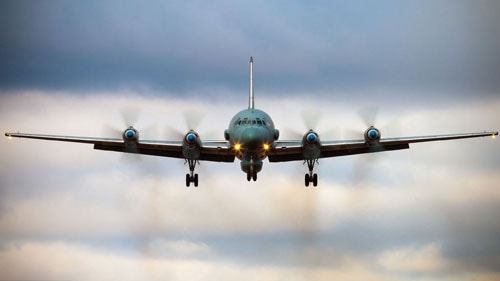Israel may pay the price for betraying Russia's trust in Syria
The Russian military's full blame for the Il-20 plane downing on Israel may make Putin tougher on Tel Aviv.
|
A Russian Il-20 reconnaissance aircraft. Photo:AFP. |
Israel seemed to breathe a sigh of relief when Russian President Vladimir Putin on September 18 said that the downing of the Il-20 reconnaissance plane in Syria was the result of a "chain of tragic accidental events" and did not blame Tel Aviv. However, Putin later added that Russia would conduct a comprehensive investigation into the incident.
When the investigation report was released by the Russian Ministry of Defense yesterday, international observers assessed it as a "slap" in the face of Israel, as most of the important points in the investigation results contradicted the information provided by Tel Aviv. Zach Battat, an expert at the Zvi Yavetsz School of Historical Studies, said that Israel will likely pay a heavy price after the incident that has destroyed Russian confidence in the Syrian battlefield, according toCGTN.
Over the past three years, Russia has agreed to build a series of measures to prevent conflicts and build trust with Israel on the Syrian battlefield, aiming to eliminate the risk of unexpected clashes in this country. However, the downing of the Il-20 reconnaissance plane that killed 15 servicemen on September 17 and Tel Aviv's subsequent response could destroy trust and negatively affect Russia's relations with Israel.
After the reconnaissance plane was shot down, Israel immediately blamed Syria's "unprofessional" air defense forces, claiming that they had "indiscriminately" launched more than 20 missiles in all directions without proper warning measures to the Russian aircraft, while asserting that their pilots were not at fault.
However, the investigation results of the Russian Ministry of Defense confirmed that Israel was the only party responsible for the tragedy, as their pilots acted in an "unprofessional manner or deliberately ignored safety regulations". The Israeli Ministry of Defense also only informed the Russian side about the airstrike one minute in advance, not enough time for the Russian reconnaissance plane to escape the danger zone.
According to Battat, what can be most easily seen through the information provided by both sides is that the Israeli F-16 fighter jet tried every way to launch missiles at the target in Latakia province, western Syria, then flew right behind the Russian Il-20 reconnaissance plane to avoid being shot down by Syrian anti-aircraft fire. Therefore, the Russian military and media blaming Israel for this tragedy is completely justified.
The Israeli F-16s were clearly well-equipped and their pilots were well-practiced for the strike, even though their target was a weapons warehouse. This shows that they knew that Syrian air defenses would respond and decided to use the Il-20 as a “shield”, despite the risk they posed to the Russian crew.
Battat pointed out that it was noteworthy that the Israeli media did not blame their pilots after the incident. In such cases, pilots are usually reprimanded, suspended, or even discharged, but all Israel mentioned afterwards was the fault of Syria, Iran, and Hezbollah, while the F-16 pilot's behavior of protecting himself at the risk of others was not mentioned.
Not only did the Russian Defense Ministry point out the "unprofessional" actions of the Israeli pilot, it also rejected Tel Aviv's claim that the S-200 missile was launched by Syrian air defenses when the Israeli fighter jet had returned to its airspace. According to the Russian military, the Israeli F-16 squadron continued flying over the waters off Syria after launching the missile, causing Syrian air defenses to mistake the Russian reconnaissance plane for an Israeli fighter jet.
| Graphic video of the process of the Russian Il-20 plane being shot down. Source: Russian Ministry of Defense |
The expert believes that President Putin will initially play the role of balancing the diplomatic and military circles in responding to Israel after the tragedy. But once the Russian Defense Ministry releases detailed evidence, Putin will certainly lean towards the military, because this is not the first time Israel has acted "irresponsibly" in Syria.
Russian Defense Ministry spokesman Igor Konashenkov said that they had sent 310 notifications to Israel about airstrikes near Israeli territory, but had only received 25 notifications when Tel Aviv carried out attacks in Syria. These notifications are also often sent by Israel shortly before airstrikes take place.
"This is a very ungrateful way of behaving given what Russia has done to the state and people of Israel recently," Konashenkov said.
Battat predicts that what happens next in the skies over Syria after the Il-20 tragedy will put Israel at a much greater disadvantage than Russia. Bilateral relations are unlikely to be severed, but the incident has certainly caused a lot of tension and the Israeli Air Force will find it difficult to continue operating freely in Syrian airspace as before.
First Vice Chairman of the Defense and Security Committee of the Russian Senate, Frants Klintsevich, yesterday also declared that the country's military is fully capable of "banning" Israeli fighter jets from operating in Syrian airspace.
According to observers, Russia is trying to end the bloodshed in Syria and build a lasting peace agreement between the factions. However, Israeli airstrikes on its territory will hinder Russia's process of creating a new Syria, forcing Moscow to take a tougher response. "At that time, Israel will only have itself to blame," Battat said.









